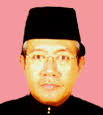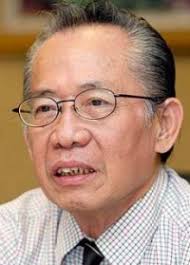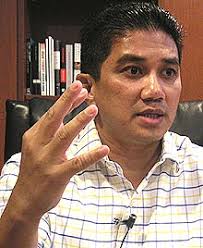 Tony Thien | Nov 13, 08 12:31pm
Tony Thien | Nov 13, 08 12:31pmIndependent state assemblyperson Gabriel Adit’s decision to join PKR is expected to give a big boost to the opposition party as it prepares for the next state elections due in 30 months.
Adit, 58, is a four-term representative who retained the predominantly-Iban Ngemah seat in the 2006 state election on an independent ticket.He will officially hand over his membership application form as well as those from his supporters during a 300-table dinner organised by ‘Friends of PKR’ in Sibu on Saturday. Adit is the organising chair of the event.
It is learnt that many members of a Dayak-based state BN component party will also be handing over their application forms to PKR advisor Anwar Ibrahim, the guest-of-honour, for the evening.
Several top Pakatan Rakyat leaders from PKR, DAP and PAS as well as their state leaders will be present to witness the event.
 Malaysiakini
Malaysiakini also learnt that
Beginda Minda (left), the ex-publicity chief of PRS president Dr James Masing-led Balleh division who made the news recently with his call on Chief Minister Abdul Taib Mahmud and Deputy Chief Minister Alfred Jabu
to resign, and his supporters are also expected to join PKR at the function.
Adit is one of the two Independent assemblypersons in Sarawak. Now that Adit is joining PKR, Dr Jonical Rayong, who contested under the
Sarawak National Party (SNAP) banner but quit the party soon after, will become the sole Independent state representative.
Although several leaders of state BN component parties have been reported in a national daily as saying they are not perturbed by the news of Adit’s impending move to join PKR, it has come at a time when there are also reports of groundswell support for PKR, especially in the rural areas.
‘Most popular party‘ among DayaksAn opinion poll conducted after the March 2008 general election among the Dayaks in Sarawak indicated that their most popular party is PKR.
There are several reasons why this is so, and among the concerns to Dayaks is the way the present Sarawak government handle the Native Customary Rights (NCR) land issue.
This has seen growing conflict on the ground between NCR landowners and plantation and logging companies and the government and increasing cases of litigation brought before the courts in Sarawak.

Adit (left) was first elected to the state assembly in 1991 and has retained it successfully ever since.
A Canadian graduate in sociology and political science and closely related to former PBDS president and former federal minister Leo Moggie, he is respected within his own community and is known to be patient and not afraid to criticise the state government.
This personality has not endeared him to some top leaders in Sarawak, including the chief minister.
It was hardly surprising that the state BN leadership did not pick him to contest in the last state election which forced him to defend the Ngemah seat as an Independent.
He defeated BN-PRS candidate Alexander Vincent, a Masing relative, by a majority of more than 500 votes.
With Adit joining PKR, the party will now have two state

assemblypersons. The other is Dominique Ng who represents the Chinese-majority seat of Padungan.
Adit conceded that there is a limit to what he can do, but by joining PKR he hopes to open the doors for other BN representatives to fight for change which he says looks inevitable, given the growing discontentment among Sarawakians against the state government.
He would not want to say more except that once he is officially in PKR, he will help his colleagues at state and national levels to build up the party’s grassroots where it counts most ahead of the state elections.
Twenty-five minutes too lateAdit told Malaysiakini that over the past several days during the sitting of the state assembly, he was approached by a number of BN representatives who tried to dissuade him from joining PKR after news of his intention leaked.
“I quoted to one of them the title of a Michael Learns To Rock (MLTR) song Twenty-five Minutes Too Late and that I have made up my mind,” he added in jest.
Apart from the opinion poll findings on responses in rural constituencies to PKR, many state BN leaders, especially from the Dayak-based parties, acknowledge the growing anti-BN sentiments on the ground, sparked by issues such as land and certain policies on education and economic opportunities.
But that change may not come easy, with almost everyone acknowledging Taib’s strong and powerful grip on Sarawak’s power politics but one of his senior party colleagues has warned that unless the NCR land issue is resolved, it could potentially become a dynamite to create a political tsunami in the next state election.
But it has been noted that many state BN top leaders appear to be still in a state of denial,

believing that under Taib’s leadership the state BN will remain formidable and should be able to remain in power for some time to come.
However, if Adit and more BN elected representatives who, to quote him, have a bitter-sweet experience inside BN, follow him to PKR, that might change the perception.
There are 29 Dayak-majority seats, 27 Malay/Melanau (Muslim)-majority seats and 15 Chinese-majority seats in the 71-seat state assembly.
Presently, DAP has six seats, all Chinese-majority, PKR one Chinese-majority seat and Independents two Dayak seats.
BN’s Sarawak United People’s Party (SUPP) could end up even worse in the next state election with the DAP expecting to make further inroads.
PBB’s Malay/Melanau-majority seats may be tough to crack but PKR is confident of giving PBB a run for their money given the known dissatisfaction within the Malay community against the state leadership over a number of issues.
The opposition will have to win half or more of the Dayak seats plus a majority of Chinese seats as well as a number of Malay/Melanau seats to topple the state BN government.
Remove personal differencesPKR’s prospects have been bolstered by a growing number of bumiputera professionals joining the party. It does not lack potentially good candidates to fill the many seats.
Supporters are urging PKR state leaders to remove personal differences and close ranks as well as for the party at the state level to forge a better working relationship with Sarawak DAP.
It’s not clear what role the other state opposition parties Snap and Star will play.
It is possible that if a broader understanding can be reached they will get to contest some seats if the right candidates come around, without opposition parties taking on each other for the same seats.
Learning from past electoral experiences and the need to avoid a clash among themselves, DAP and PKR are likely to agree on seat allocation, especially in Chinese-majority areas.
Sources said that the PKR national leadership want to see the party’s state organisation further strengthened, after Adit’s entry into the party, with strategies more focused on the objectives it has set out to achieve in Sarawak.
The question ahead of the huge Sibu gathering is after Adit’s entry and that of his supporters applying to join the party at the same time, what significant impact will it have especially in the rural areas.
Will, as the Ngemah state representative hopes, it open the doors for not just more BN reps but also the grassroots of other Dayak-based parties to join PKR?





































